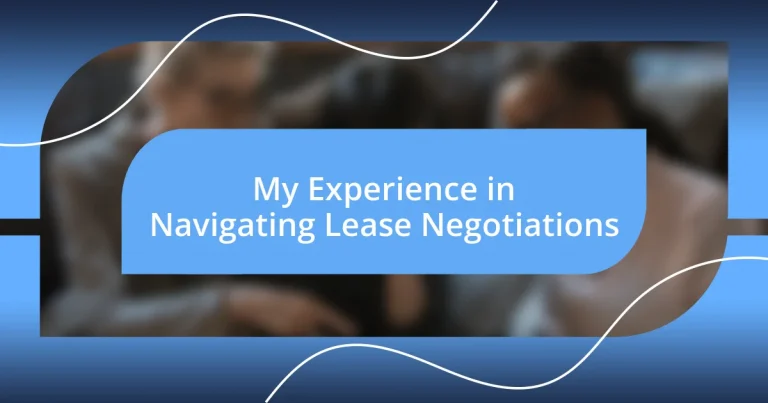Key takeaways:
- Preparation is crucial: Conduct thorough market research and create a prioritized list of needs and wants to empower confident negotiations.
- Understand key lease terms: Familiarize yourself with critical elements like base rent, rent escalation, and maintenance responsibilities to enhance negotiation power.
- Maintain clear communication: Confirm agreements in writing, set timelines for next steps, and foster a positive relationship with landlords for smoother interactions.
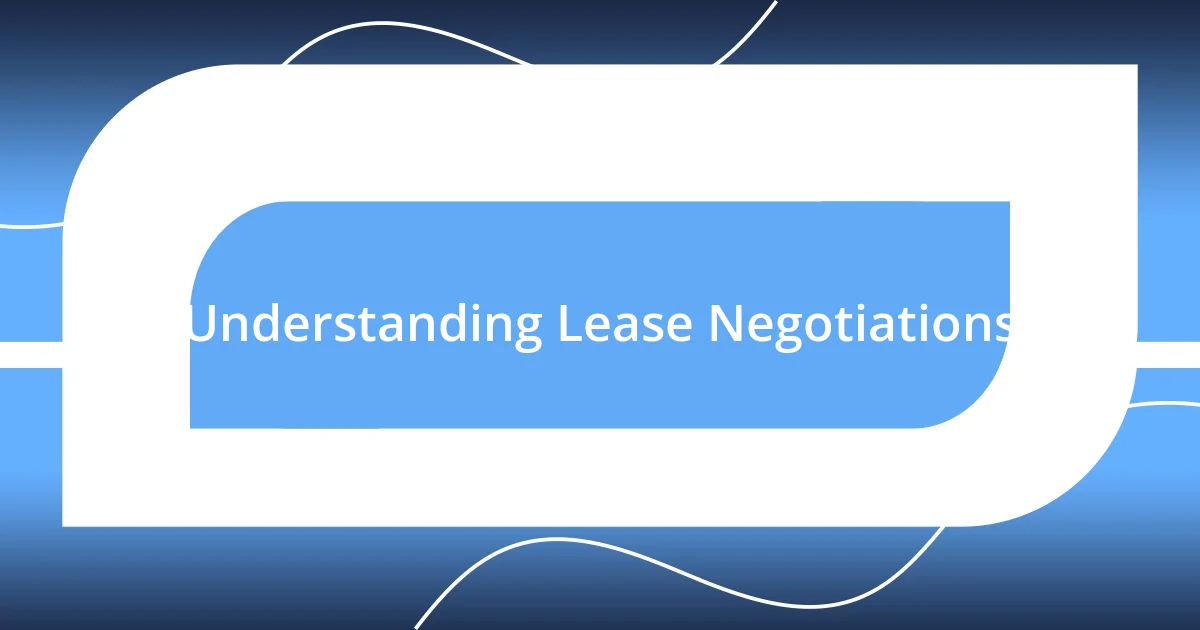
Understanding Lease Negotiations
Lease negotiations can feel intimidating at first, but I have come to realize they are a dance of give and take. When I first entered this realm, I found myself overwhelmed by the various terms and clauses. Questions swirled in my mind: What do these really mean? How do they affect me in the long run? Understanding the lingo is crucial, as it empowers you to navigate the conversation with confidence.
One of my most memorable negotiations involved a small storefront I was eyeing. With every back and forth, I felt a mix of excitement and anxiety. I couldn’t help but wonder if I was making the right moves. That emotional tug-of-war highlighted the importance of having clear priorities. Knowing what I needed versus what I wanted helped me stay focused and assertive during discussions.
I’ve often found that the emotional aspect of lease negotiations is just as significant as the numbers on the page. It’s about crafting a space that resonates with your vision. Have you ever felt a place just click for you? In those moments, I learned to articulate my vision clearly, which not only helped me connect with the landlord but also emphasized the value I brought to the table. Being able to express my passion made the negotiation feel less like a transaction and more like a partnership.
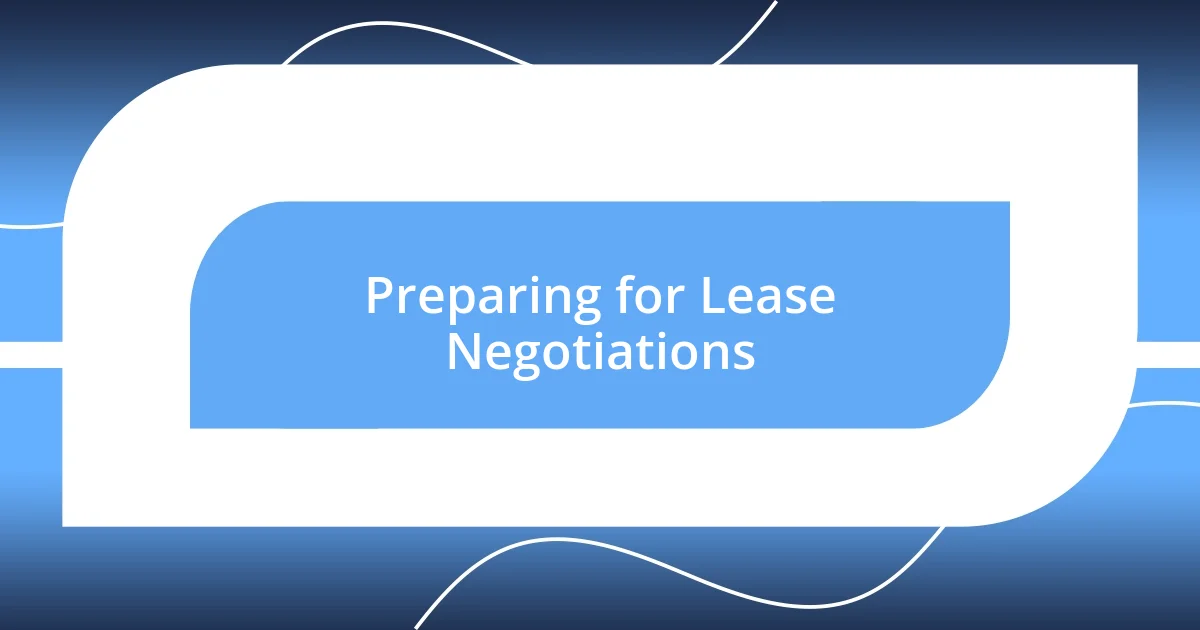
Preparing for Lease Negotiations
Preparing for lease negotiations requires a solid foundation of research and self-awareness. I remember my first negotiation vividly; I had a general idea of my budget, but I didn’t delve into market research. It was eye-opening to realize how different rental prices could be in various neighborhoods. By investigating comparable listings, I gained clarity and real leverage in discussions. This preparation not only boosted my confidence but also made it easier to justify my offers.
Creating a detailed list of my needs and wants was another game changer. In my last lease negotiation, I categorized my must-haves, like square footage and parking, and my nice-to-haves, like outdoor space. This approach clarified what I could bend on and what was non-negotiable. I often advise friends to visualize their ideal space, helping them articulate their desires during discussions. It’s amazing how much clarity this can bring when emotions run high.
Having a clear understanding of the terms beforehand is crucial. During a lease negotiation, I faced a complex clause about rent escalation that left me puzzled. Taking the time to research and consult with experts beforehand made all the difference. I could navigate the conversation with confidence and even negotiated for a more favorable term. Ultimately, thorough preparation can transform a stressful experience into a more manageable and empowering journey.
| Key Preparation Steps | Personal Insights |
|---|---|
| Research Rental Market | Foreshadowing outcomes can prevent overpaying. |
| List Needs vs. Wants | Helps in prioritizing and staying focused during negotiations. |
| Understand Lease Terms | Knowledge equips you to challenge unfavorable clauses. |
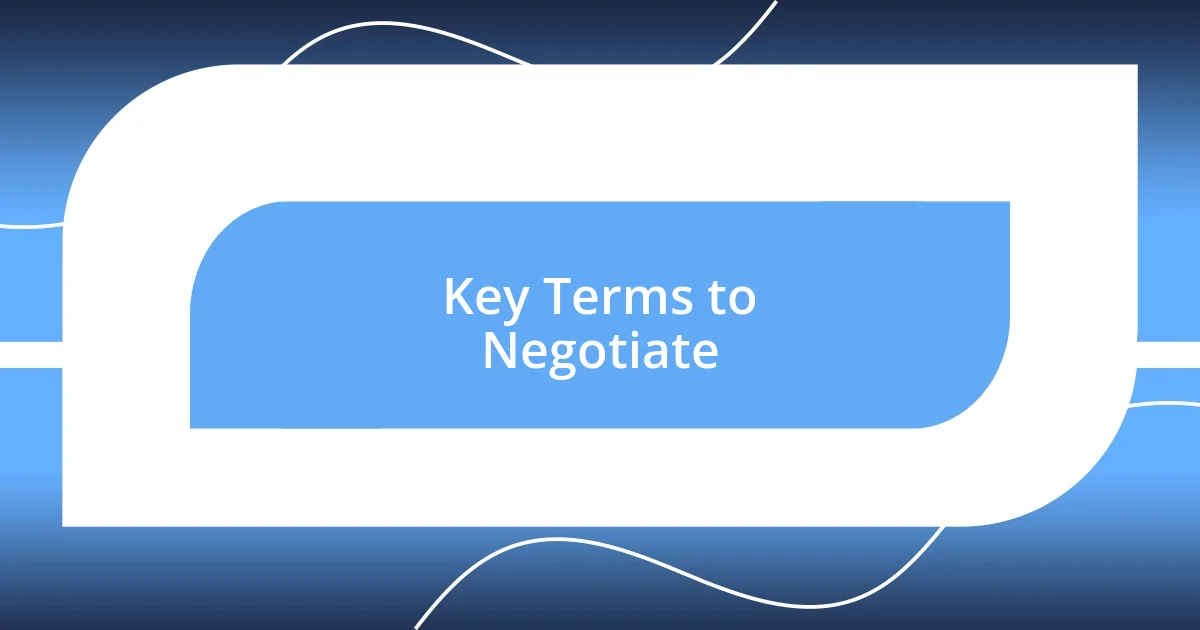
Key Terms to Negotiate
Understanding the vital terms of a lease can significantly influence your negotiation power. I remember a time when I overlooked certain key elements. It was a steep learning curve, yet it drove home the importance of understanding things like rent increases and maintenance responsibilities. These details, though seemingly minor, can shape your experience immensely.
Here are some critical terms to focus on when engaging in lease negotiations:
- Base Rent: The initial amount you’ll pay, but be aware of escalation clauses that may alter it.
- Rent Escalation: Understand how and when your rent might increase. Knowing this can help avoid unpleasant surprises later.
- Lease Duration: Determine how long you want to commit and what penalties exist for breaking the lease early.
- Security Deposit: Clarify the amount and conditions for its return. I once lost a significant sum because of unclear terms.
- Maintenance and Repairs: Outline which party is responsible for what, especially for larger issues that might arise during your lease.
Navigating these terms proactively turns what could be a daunting process into a more manageable conversation. I often reflect on how diligent attention to these details shaped my leasing outcomes and fostered more cooperative relationships with landlords.
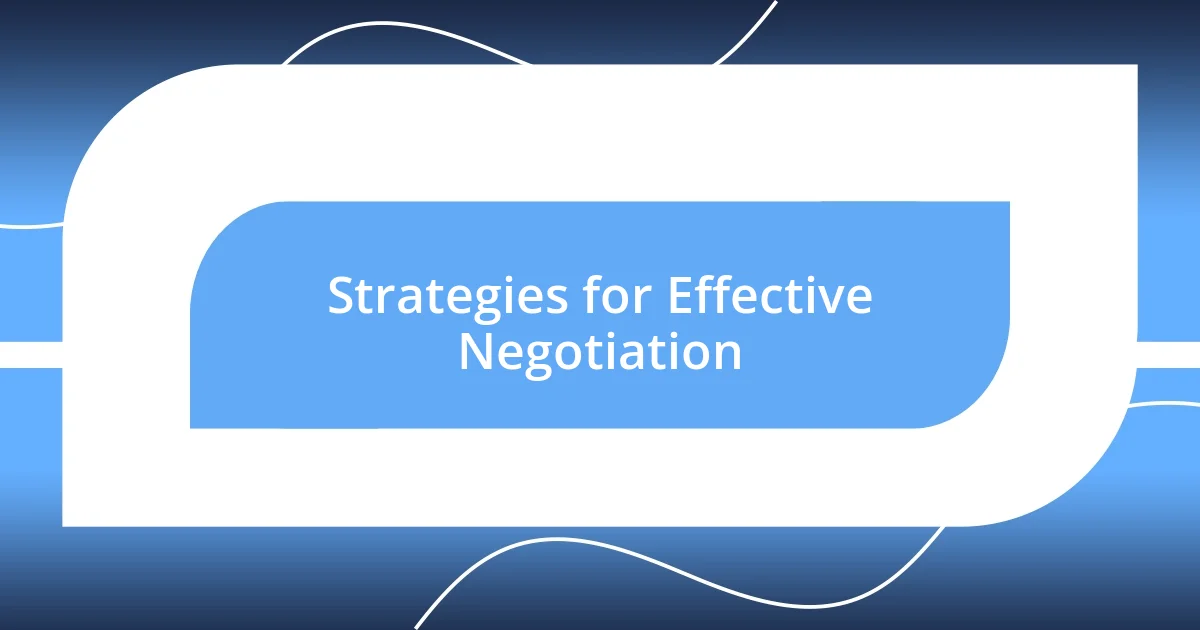
Strategies for Effective Negotiation
When it comes to effective negotiation strategies, being a good listener is key. I recall a particular instance where I was clearly focused on my own terms, but tuning into my landlord’s concerns opened a door to a more collaborative discussion. Have you ever been surprised by what you learn just by paying attention? That moment made me realize that understanding the other party’s perspective not only strengthened my position but also fostered trust, paving the way to better outcomes.
Another powerful strategy is to remain flexible. In one of my negotiations, I found myself willing to shift on lease duration after discovering how much my potential landlord valued long-term tenants. It dawned on me that sometimes, small concessions can lead to bigger gains. Why hold firm when a little give can help establish goodwill and perhaps even secure lower rent? It’s a dynamic that often benefits both sides and turns the negotiation into a win-win scenario.
Lastly, I advocate for utilizing silence as a tool. I once sat in a meeting where I felt the urge to fill every awkward pause with chatter. However, I learned that letting silence linger can prompt the other party to divulge information or propose terms I hadn’t considered. It’s about creating space for thoughtful responses rather than rushing to fill the gaps. Have you tried using silence in your discussions? You’ll find that it can be a surprisingly powerful negotiation tactic, one that invites deeper dialogue and understanding.
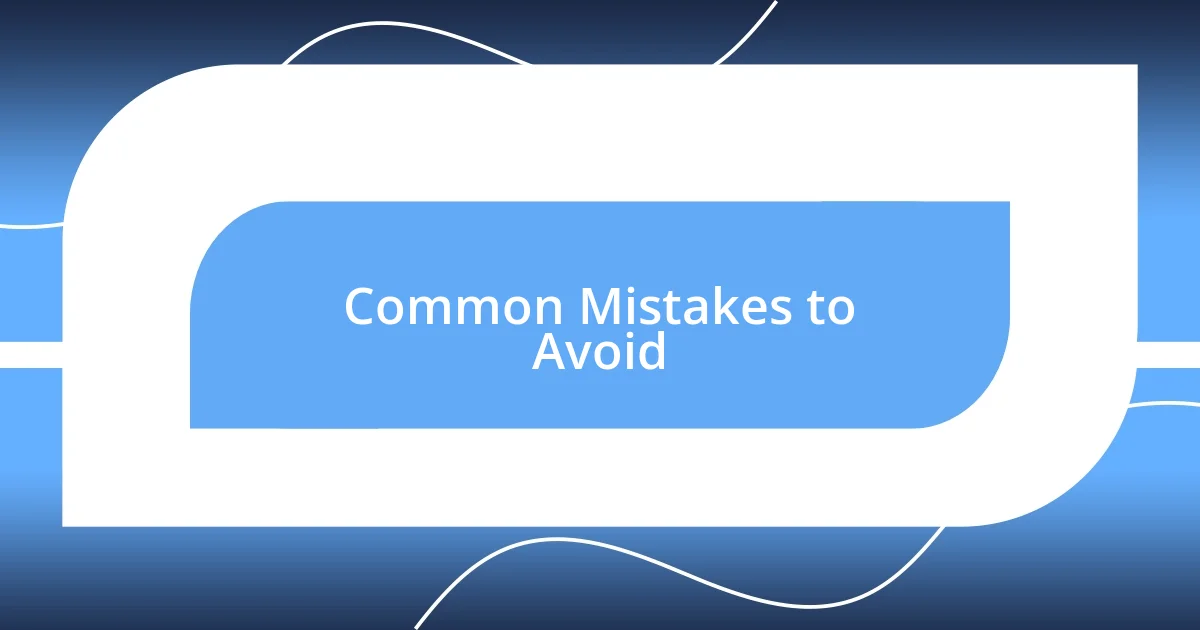
Common Mistakes to Avoid
One common mistake I often see is failing to prepare adequately before the negotiation. I learned this the hard way during a particularly tense leasing situation. I walked in without thoroughly researching market rates or comparable properties, and it left me feeling vulnerable. Have you ever felt that sense of uncertainty? It’s crucial to arm yourself with data and insights—it shifts the negotiation in your favor.
Another pitfall is ignoring the fine print. I remember skimming through a lease agreement and assuming everything was straightforward, only to stumble upon a clause that significantly affected my decision. When I finally did a deeper dive, I felt both relieved and embarrassed. It’s so important to read between the lines. Could a simple oversight lead to unexpected costs down the line? Trust me, taking the time for a meticulous review saves headaches later.
Lastly, don’t underestimate the power of timing. I once rushed into a negotiation without considering the time of year or the landlord’s current pressures. In hindsight, a little patience could have yielded a much better deal. Why rush when waiting might serve you better? Understanding the broader context can significantly influence outcomes, leading to a more favorable agreement for both parties.
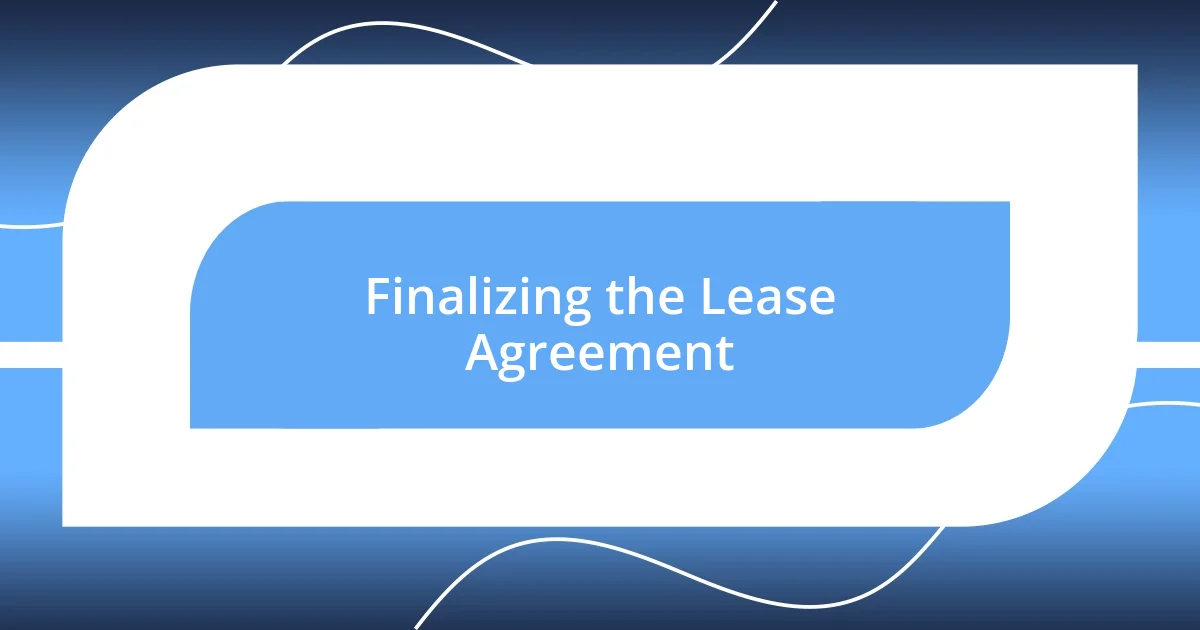
Finalizing the Lease Agreement
Finalizing the lease agreement can be both exhilarating and nerve-wracking. I vividly remember the moment I received the final document in my inbox. My heart raced as I realized I was just one signature away from sealing the deal, but I took a deep breath and ensured I had thoroughly reviewed every detail once more. Has that ever happened to you, where excitement makes you overlook the important stuff? I promised myself that I wouldn’t rush into signing without scrutinizing those final terms.
After all the negotiations, I found that maintaining a clear line of communication with my landlord was crucial. I made it a point to discuss the specifics of the agreement directly, asking questions about elements that weren’t entirely clear to me. One instance where I sought clarification on maintenance responsibilities not only reassured me but also highlighted my earnestness to understand my obligations. Have you thought about how asking the right questions can shape your perception of the lease? It’s true—it’s often the dialogue that cements the relationship, leading to smoother interactions down the line.
Once I was satisfied with the agreement, I took a moment to reflect on everything I had learned during the process. It was a mix of relief and accomplishment, knowing I had navigated the journey successfully. I remember thinking, “What if I hadn’t invested the time to learn about my rights and responsibilities?” That awareness gave me confidence in finalizing the lease. I encourage you to take that moment of reflection too. It amplifies your learning experience and prepares you for future negotiations.
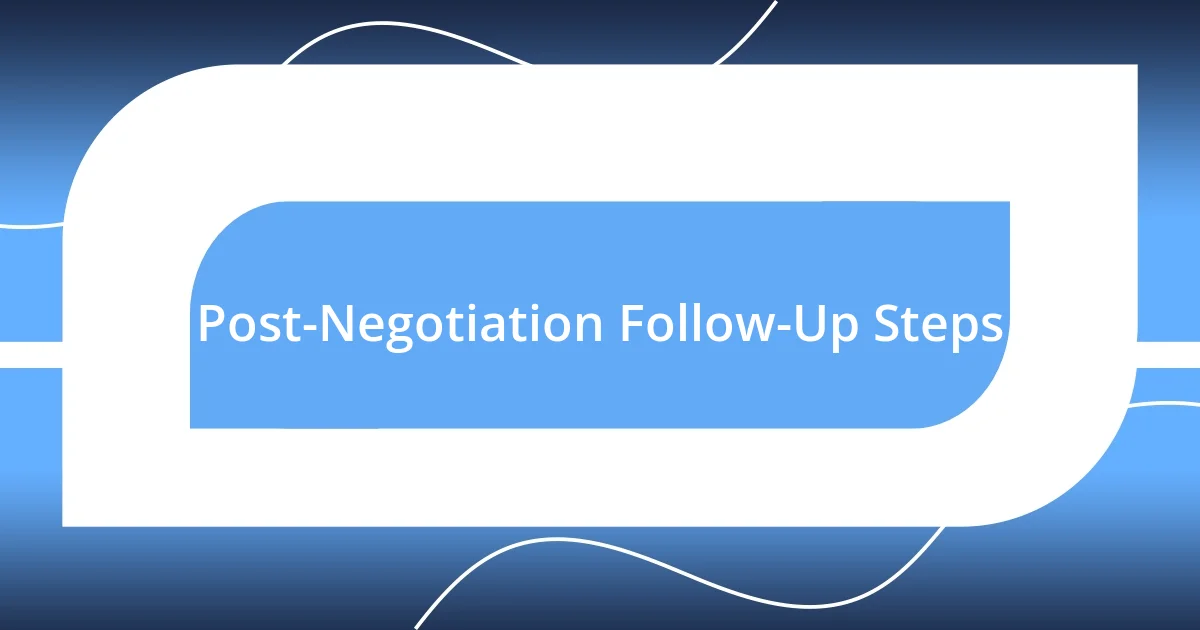
Post-Negotiation Follow-Up Steps
Following a negotiation, the first step I always take is to confirm the outcomes in writing. I remember my first lease negotiation; I eagerly typed up a summary of our discussions and sent it to my landlord. It wasn’t just about being professional; it was a way to ensure we were both on the same page. How reassuring is it to have a written record that outlines what was agreed upon?
Next, I focus on establishing a timeline for the next steps, such as when the sign-off will happen or when I can expect the first payment. I once had a situation where poor timing on communication led to confusion about my move-in date. By setting clear deadlines, you eliminate those uncertainties. Have you ever had to scramble because of unclear schedules? It’s an almost avoidable stress if you just clarify expectations upfront.
Finally, I believe maintaining a friendly rapport post-negotiation is key to a successful lease experience. After securing the deal, I scheduled a casual coffee break with my landlord to discuss any lingering details. This approach not only built goodwill but also gave me a chance to address any potential concerns. Isn’t it convenient when a friendly atmosphere can make future interactions so much easier? Long-term relationships often hinge on these early connections, setting a positive tone for the lease period ahead.












